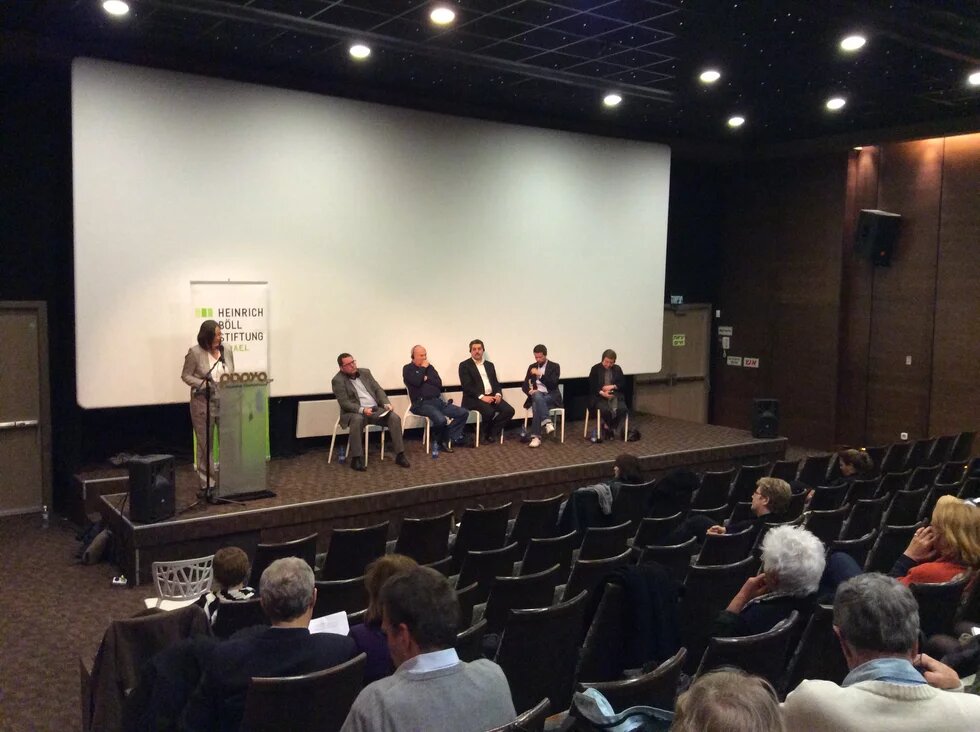
A Chance for Change was the latest in a series of ‘Jerusalem Talks’ held by the Heinrich Böll Foundation at Jerusalem’s Cinematheque on March 2nd 2015. Framed with a question mark in the title of the event, the Israeli panelists’ response could not have been clearer: “It’s not just wishful thinking, there is a wind of change- even if we only feel the seeds now” Nathan Sharoni, a retired Israeli Defense Forces General, one of the five panelists, said in his opening comment on his perception of the upcoming elections.
Like the two other Israeli panelists, former Meretz Knesset Member and Deputy Knesset Speaker Naomi Chazan, and Jafar Farah, Director of Mossawa, Sharony displayed a generally optimistic attitude towards the potential outcome of the elections for a new government on March 17th. Farah emphasized the important role of the Palestinian community in Israel as “leaders of the spring”, referring to the newly built Joint List of the Arab parties and Hadash as a potential game changer for the political arena in Israel. Naomi Chazan, joining in the expression of hope added, that it is the first time since 1999, that “there is a credible alternative to the right in Israel” on the horizon, referring to the possibility that the newly formed “Zionist Camp” might be able to form the next government, replacing current Prime Minister Netanyahu . Amidst these almost euphoric expressions of hope for a change, it was the German journalist Torsten Teichmann who spoiled the Israeli panelists’ expectations for a major change in Israeli politics by pointing to the reasons why a re-election of Netanyahu for a third term as prime minister is morelikely, hinting at the support from right-wing and religious parties which he will most likely be able to count on to support him.
The seeds for an Israeli spring?
Nevertheless, all the panelists emphasized the need for a profound political and social change in Israel, pointing out that the general Israeli public is dissatisfied with the current government’s performance, or, as Naomi Chazan put it: “with all due respect for scepticism, the first step is to change the government and then move on to the next change and do some good. Netanyahu is a catastrophe, not only for the Palestinians, but also the Israelis. He is undermining the moral basis of the State of Israel.”
Sharoni and Chazan highlighted their criticism of the Netanyahu government mostly with examples from domestic socio-economic issues that they consider to be insufficiently tackled by the current government. Nonetheless, the connection between the ongoing occupation of the West Bank and the socio-economic issues in Israel were raised by all panelists. “There is a lot of anger about non-performance of the government in the last 5 years and racism has become a way of life, on which racist legislation closely follows”, Sharoni said. By citing the government’s indifference in fighting soaring housing costs, he also linked the Israeli public’s dissatisfaction with the government to the failure of the Netanyahu government to come to terms with the Palestinian neighbors in reaching any kind of peace agreement. The absence of any creative or innovative initiative in order to challenge the status quo, has put “Netanyahu into a modus of survival” disregarding the options for a change, as Sharoni stated cynically. Jafar Farah disagreed with Sharoni in this point by explaining that in his opinion, the right wing Likud-led government was not simply passive and inefficient but had actively spent much of the last decade building new settlements in the occupied West Bank, demolishing Palestinian homes, and waging three wars against the Palestinians in Gaza.
Despite all his criticism of the political arena in Israel, Jafar Farah also saw good reasons for optimism. He pointed to the important, if not most important agents in the upcoming elections: the Palestinian citizens of Israel. The list of three Arab parties and Hadash, the so-called “Joint List” is “a big chance for changing the mindset of Jewish Israelis and at the same time, to democratize the Arab-Palestinian society in Israel.”“The Joint List has a lot to contribute to the discourse, not just Palestinian-Arab issues, but also social justice. The Joint party can be part of the 61 seats that can put forward a program of change, social justice and so on. And if there is any real process on the horizon, then the Palestinians (of Israel) could join a future government.”
Is it all just about mathematics?
Recent polls clearly indicate that many people are opting for a change of government in Israel. Nonetheless, the role of the small parties will again be a decisive one in these elections, since they will tip the scales in the formation of a government. “Israeli politics is all about mathematics” said Naomi Chazan, pointing to the counting game that will start after March 17th. But at the end of the day, and on this point all the panelists agreed, change will not come in a person such as Isaac Herzog or Tzipi Livni. Change has to come from a new vision for an active and vibrant citizenship that many Israelis seem to be endorsing in these elections for a change.